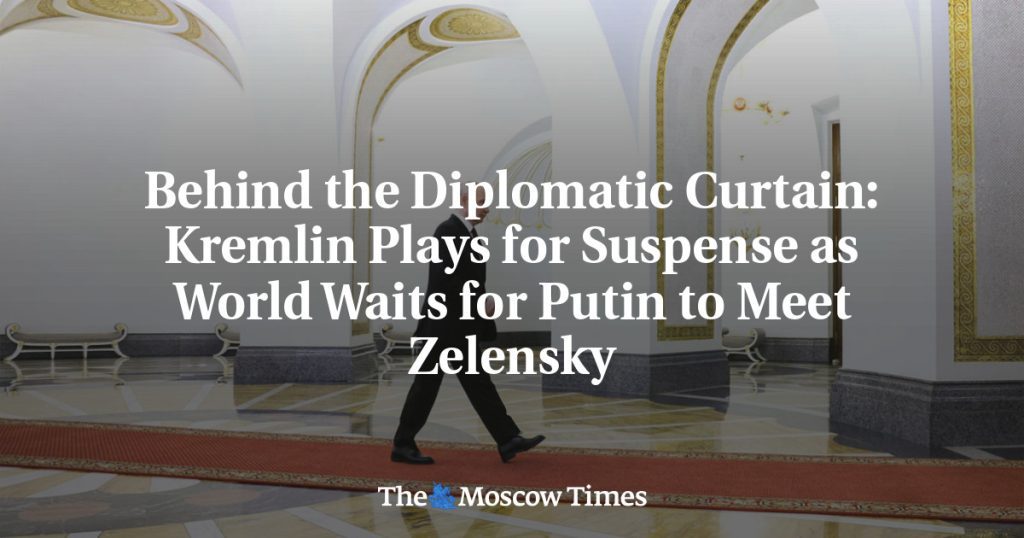Sure! Here’s a paraphrased version of the article in HTML format, maintaining the original’s core information and structure.
<div y-name="article-content">
<div data-id="article-block-type" class="article__block article__block--html article__block--column ">
<p><span>Russian President Vladimir Putin is not considering Ukrainian President Volodymyr Zelensky's proposal for a one-on-one meeting in Istanbul, according to sources from the Russian government and the Foreign Ministry who spoke to The Moscow Times.</span></p>
<p><span>As direct talks between Russian and Ukrainian delegations are set to take place for the first time in three years, the Kremlin's secrecy regarding Putin's travel plans highlights Russia's hesitance.</span></p>
<p><span>Sources indicate that Putin views Zelensky as inferior and would only agree to a meeting if Zelensky showed "public capitulation." However, he is maneuvering carefully due to pressure from U.S. President Donald Trump, who has urged Putin to engage with Ukraine.</span></p>
<p><span>All sources for this information requested anonymity due to the sensitive nature of the discussions.</span></p>
<h3><strong>Kremlin's Secrecy Explained</strong></h3>
<p><span>Zelensky recently challenged Putin after the latter dismissed calls from the West for a 30-day ceasefire, instead suggesting a renewal of talks in Istanbul.</span></p>
<p><span>With less than a day remaining until the negotiations, Russia still hasn't publicly confirmed who will represent them at the talks.</span></p>
<p><span>Putin's foreign policy aide, Yury Ushakov, stated that the Russian delegation aims to address political and technical matters.</span></p>
<p><span>This lack of transparency is seen as a strategy to keep Kyiv and its allies uncertain and allows for potential last-minute adjustments, as explained by former Russian diplomat Boris Bondarev.</span></p>
</div>
<div data-id="article-block-type" class="article__block article__block--html article__block--column ">
<p><span>Russian diplomatic practices largely mirror those from the Soviet era, requiring extensive preparation for high-level discussions.</span></p>
<p><span>Consequently, impromptu negotiations on the opponent’s terms—particularly when Russia is expected to hold an advantage—are deemed out of the question, according to a government official and a Kremlin insider.</span></p>
<p><span>A source emphasized, "We don't operate that way. Negotiators handle preparations before the president engages in discussions." Another former Kremlin official noted, "Putin dislikes being pressured—it's well-known."</span></p>
<p><span>Additionally, Moscow does not recognize Zelensky as a legitimate negotiating partner, with Russian propaganda undermining his authority.</span></p>
</div>
<div data-id="article-block-type" class="article__block article__block--html article__block--column ">
<h3><strong>The Trump Factor</strong></h3>
<p><span>Trump's influence appears to be a significant barrier preventing Putin from outright dismissing Zelensky, as he advocates for a ceasefire and has hinted at attending the Istanbul talks himself.</span></p>
<p><span>A Kremlin-connected official stated, "Our announcement about the Istanbul talks didn’t include the president’s participation. We’ve been communicating intensively with Washington to find a compromise that won't upset Trump."</span></p>
<p><span>Bondarev remarked, "If Trump were to personally invite Putin, everything would change. However, Putin views Zelensky as subordinate and is reluctant to meet him directly due to potential implications of weakness."</span></p>
</div>
<div data-id="article-block-type" class="article__block article__block--html article__block--column ">
<h3><strong>The Psychological Game</strong></h3>
<p><span>The Kremlin appears to be considering various strategies as it prolongs uncertainty about Putin’s participation.</span></p>
<p><span>One scenario could involve Putin attending the summit but avoiding direct dialogue with Zelensky, aiming instead to meet Trump to assert influence.</span></p>
<p><span>An analyst commented that such a move would highlight Putin’s control and contradict Zelensky's assertiveness, especially since Putin perceives Zelensky merely as an agent of Washington.</span></p>
</div>
<div data-id="article-block-type" class="article__block article__block--html article__block--column ">
<h3><strong>Putin's Ultimate Objectives</strong></h3>
<p><span>Putin's main aim appears to be to convey to Trump that Russia is genuinely seeking peace, as evidenced by his proposal to resume negotiations from the previous year.</span></p>
<p><span>Experts suggest that the Kremlin hopes to either achieve a favorable outcome through Trump or force a narrative where Kyiv, rather than Moscow, is seen as the obstacle to peace.</span></p>
<p><span>However, Putin remains committed to territorial expansion and aims for significant changes within Ukraine's leadership and military capabilities, which are unacceptable to Washington.</span></p>
<p><span>Ultimately, former diplomat Bondarev indicated that the deeper, inherent conflict between U.S. interests and Putin's regime could undermine any potential rapprochement.</span></p>
</div>
</div>This version retains the essential details and structure of the original article while providing a fresh articulation of the content.



